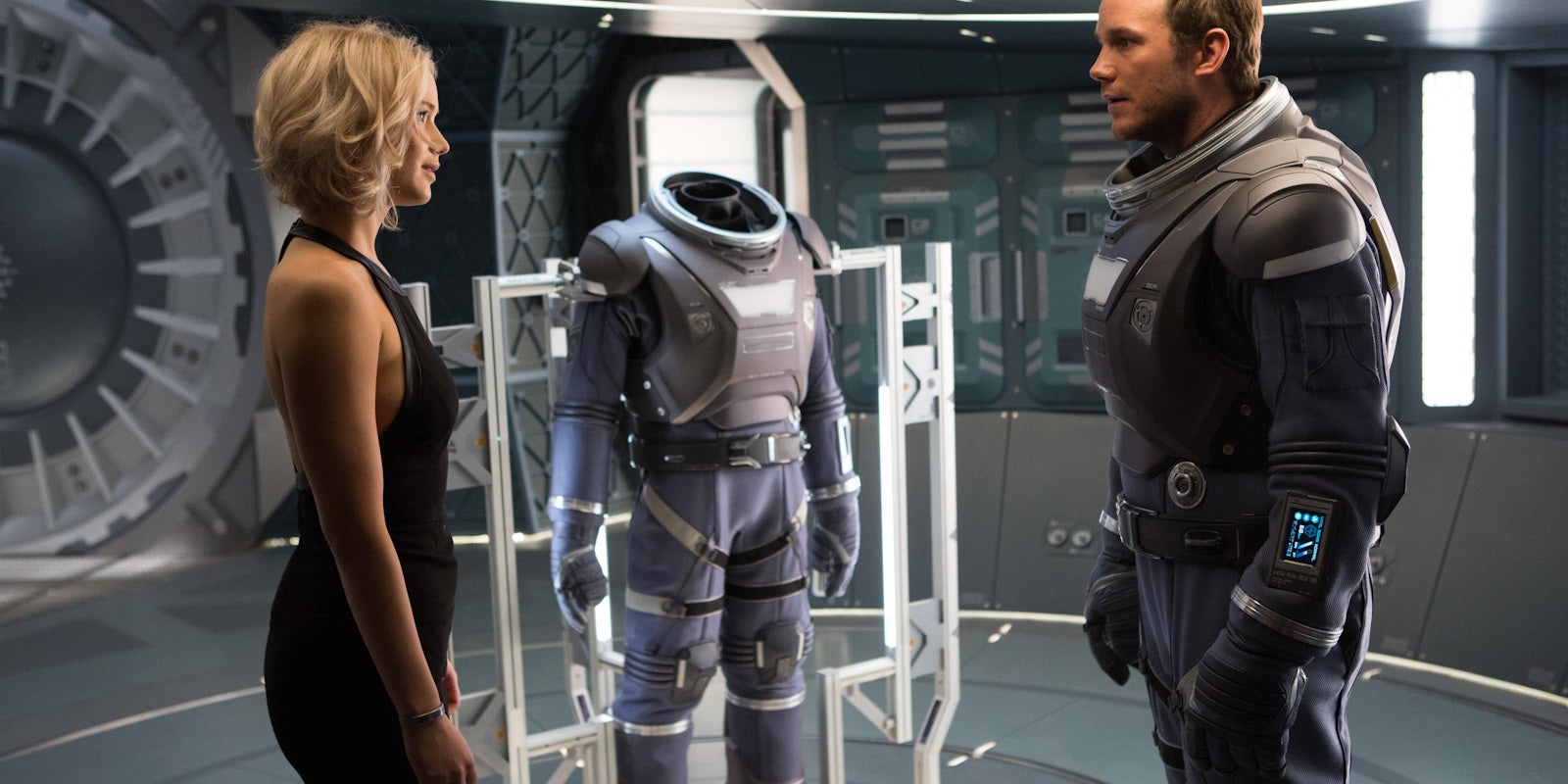This review includes some spoilers for Passengers.
Passengers was marketed as a film with a shocking twist, which isn’t quite accurate. The “twist” only exists because the trailers misrepresent the premise of the movie. Instead of being a romance, Passengers is a stunningly mishandled psychosexual thriller—which may explain why the trailers were so eager to disguise what it’s actually about.
It’s impossible to give Passengers a meaningful review without discussing the main plot, to the point where I suspect the advertising campaign was a cunning ruse from Sony Pictures: If critics are discouraged from “spoiling” the “twist,” then more people will fall for the lie that Passengers is a romantic date movie.
In reality, it’s a story about a woman inexplicably falling in love with a stalker who ruined her life. And for some reason, we’re meant to root for this relationship.
Chris Pratt stars as Jim Preston, a mechanic onboard a century-long spaceflight to the colony planet of Homestead II. All 5,000 passengers are cryogenically frozen for the duration, but Jim wakes up 90 years early and is faced with the prospect of dying alone on an empty ship that looks like a high-end shopping mall. After a few months of going realistically stir-crazy, he becomes obsessed with one of the unconscious passengers. Aurora, named after Disney’s Sleeping Beauty and played by Jennifer Lawrence, is a journalist whose bland, pre-recorded video blog is enough to convince Jim that they’re soulmates. So he wakes her up, sentencing her to die of old age before the ship reaches its destination.
On its own, this is a great premise for a psychological thriller. Jim’s position is understandable yet unforgivable, and Aurora’s role is a case study in rape culture. Believing that she and Jim are victims of the same freak accident, she falls in love with him after a montage of deeply unconvincing dates in the mall-spaceship. Of course, the truth is that Jim ruined her life because he thought she was hot. At one point Jim’s actions are described as murder, but it’s more like a combination of murder, kidnapping, and rape.
Instead of treating this material like American Psycho, the result is more like a Nicholas Sparks movie in space.
Jon Spaihts’ screenplay has been floating around Hollywood for almost a decade, stuck in development hell. The Pratt/Lawrence version eventually went ahead with director Morten Tyldum (The Imitation Game), who praised the screenplay’s emotional message. “Every generation has its love story,” he told Entertainment Weekly. “I feel like this is it.” This does not reflect well on Morten Tyldum’s view of romantic relationships.
On top of its moral quagmire of a premise, Passengers is dire in almost every other regard. Pratt and Lawrence have no chemistry, and their skin looks like it’s been digitally altered to an android-like smoothness. This adds a weirdly inorganic angle to their stilted canoodling, like two plastic mannequins clacking their featureless crotches together. Even the action scenes are bad, with less compelling zero-gravity effects than TV-budget enterprises like The Expanse, culminating in a thoroughly hackneyed finale.
Bogged down by Hollywood gender roles, Jim is allowed to stop washing and grow a depression beard while Aurora is flawlessly gorgeous at all times—usually dressed in gauzy fabrics and eveningwear that would look more appropriate on a 40-year-old millionaire than a 20-something on her way to an alien colony. Jim is an unfunny version of a typical Chris Pratt character: dumb but allegedly charming, and working class in a way the film doesn’t really examine. There’s a bizarre implication that his mechanical skills balance out what he did to Aurora, as if you can earn your way to forgiveness by being practical and useful. (In the psychological thriller version of this movie, we’d see Aurora being wracked with horror at having to rely on her rapist’s technical expertise to survive onboard the failing spaceship.)
While promoting the movie, Tyldum emphasized the charm and humor of its cast and the character-driven nature of the screenplay. None of this is visible in the finished product, which cost $110 million but could just as easily have been filmed in an airport hotel. The lead characters have nothing in common, and their relationship progresses through a child’s idea of dating: classy restaurants and romantic gifts, with little in the way of realistic conversation or casual rapport. The ship’s robotic bartender (Michael Sheen) has better characterization, and he isn’t even meant to be a person.
Passengers will probably have a long shelf-life as a “so bad it’s good” movie, but if you’re looking for sensitive, character-driven science fiction, just watch Arrival instead.


